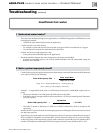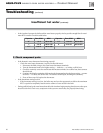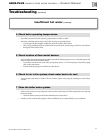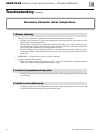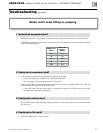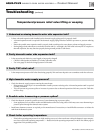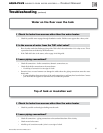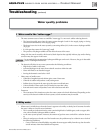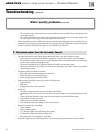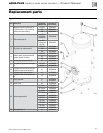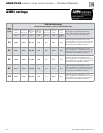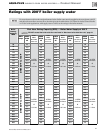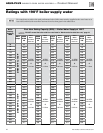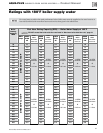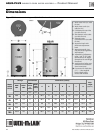
AQUA PLUS indirect-fired water heaters — Product Manual
Water quality problems
1 Water smells like “rotten eggs.”
• The most common cause of water to smell like “rotten eggs” is a non-toxic sulfate reducing bacteria.
• The bacteria usually enters into the water system through a break in the supply piping or during
construction/maintenance of the supply piping.
• The bacteria survives in the water system by converting sulfate (SO
4
) in the water to hydrogen sulfide
(H
2
S) gas.
• It is this gas that creates the “rotten egg” smell.
• The presence of hydrogen sulfide can also affect the taste of the water.
• Along with the stench caused by this bacteria, black deposits that typically indicate pipe and/or fitting
corrosion may also appear in the water.
In extremely high concentrations, hydrogen sulfide gas can be toxic. However, the gas is detectable
prior to reaching harmful levels.
• The bacteria will thrive in any water system under the following conditions:
• High levels of sulfur in the water
• Activated hydrogen in the water from cathodic reactions within the tank
• Water with little or no dissolved oxygen
• Storing the domestic water below 130ºF
• Other causes of smelly water:
• Chlorides of magnesium and calcium gives water a bitter taste
• Chloride of sodium will produce a salty tasting water
• Sulfates above 50 ppm in the water gives the water a medicinal taste.
• Carbon dioxide in water with a low pH results in water that is fizzy.
• Iron and tannic waters will produce water with a bad taste and odor.
• Treatment
• The treatment of this situation requires the water system to be shock-chlorinated. Depending on the
severity of the bacteria within the water system, several treatments may be needed.
2 Milky water.
• When water is initially drawn from the faucet it appears to be milky or cloudy, but it becomes clear after
the water is allow to stand for several minutes.
• This is usually an indication that the water contains high levels of soluble gases, such as oxygen, chlo-
rine, carbon dioxide, hydrogen sulfide or others.
• As the water system pressure increases, the amount of gas that water can hold in a solution decreas-
es.
• When air and gases are forced out of the heated water, the problem may be evident in one or both of
the following conditions:
• Gases, in the form of small bubbles, may make the water appear milky from the tap, but clear after
several minutes when those bubbles will separate.
Troubleshooting
(continued)
Part number GL-E223-ADOC 0311
37



